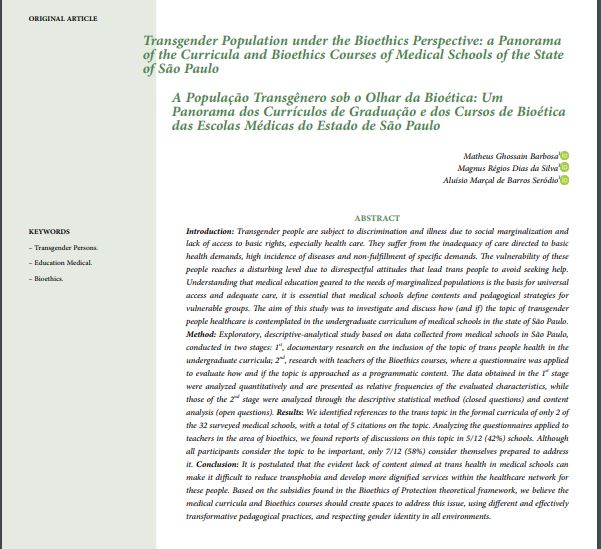A População Transgênero sob o olhar da Bioética: Um Panorama de Currículos de Graduação e dos Cursos de Bioética das Escolas de Medicina do Estado de São Paulo
by Matheus Ghossain Barbosa;
Magnus Régios Dias da Silva;
Aluísio Marcal de Barros Seródio.
ABSTRACT
Introduction: Transgender people are subject to discrimination and illness due to social marginalization and lack of access to basic rights, especially health care. They suffer from the inadequacy of care directed to basic health demands, high incidence of diseases and non-fulfillment of specific demands. The vulnerability of these people reaches a disturbing level due to disrespectful attitudes that lead trans people to avoid seeking help. Understanding that medical education geared to the needs of marginalized populations is the basis for universal access and adequate care, it is essential that medical schools define contents and pedagogical strategies for vulnerable groups. The aim of this study was to investigate and discuss how (and if) the topic of transgender people healthcare is contemplated in the undergraduate curriculum of medical schools in the state of São Paulo.
Method: Exploratory, descriptive-analytical study based on data collected from medical schools in São Paulo, conducted in two stages: 1st, documentary research on the inclusion of the topic of trans people health in the undergraduate curricula; 2nd, research with teachers of the Bioethics courses, where a questionnaire was applied to evaluate how and if the topic is approached as a programmatic content. The data obtained in the 1st stage were analyzed quantitatively and are presented as relative frequencies of the evaluated characteristics, while those of the 2nd stage were analyzed through the descriptive statistical method (closed questions) and content analysis (open questions).
Results: We identified references to the trans topic in the formal curricula of only 2 of the 32 surveyed medical schools, with a total of 5 citations on the topic. Analyzing the questionnaires applied to teachers in the area of bioethics, we found reports of discussions on this topic in 5/12 (42%) schools. Although all participants consider the topic to be important, only 7/12 (58%) consider themselves prepared to address it.
Conclusion: It is postulated that the evident lack of content aimed at trans health in medical schools can make it difficult to reduce transphobia and develop more dignified services within the healthcare network for these people. Based on the subsidies found in the Bioethics of Protection theoretical framework, we believe the medical curricula and Bioethics courses should create spaces to address this issue, using different and effectively transformative pedagogical practices, and respecting gender identity in all environments.
- To read and download the full article in PDF file in English, please click in the image below.
